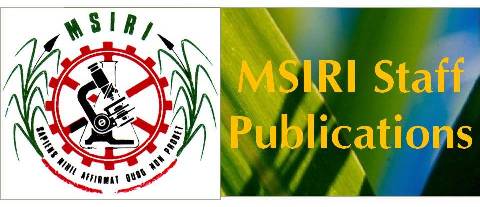Genetic transformation of sugar cane mediated by Agrobacterium tumefaciens
| MSI02P3731 | |
| Mulleegadoo, K. Dookun-Saumtally, A. | |
| (La transformation génétique de la canne à sucre par Agrobacterium tumefaciens) | |
| Genetic transformation of sugar cane mediated by Agrobacterium tumefaciens | |
| Periodical article | |
| 2001/02 | |
| Revue agric. sucr. Ile Maurice | |
| 80(3)/81(1-3): 167-170 | |
| Published 2003 | |
| En | |
| En Fr | |
| Transgenic sugar cane has been obtained using Agrobacterium-mediated transformation. Embryogenic callus of variety M 292/70 was co-cultivated for 2 days with Agrobacterium tumefaciens strain AGLO harbouring the plasmid pTO134 which contains the phosphinotricin acetyl transferase (bar) and the green fluorescent protein (gfp) genes. After one-week culture on non-selective callus induction medium, callus was transferred on regeneration medium supplemented with bialaphos. Putative transformants were transferred to the glasshouse and integration of the bar gene analysed by PCR and Southern hybridization. Out of fourteen plants analysed by PCR, seven gave the expected amplifiable fragment of the bar gene. Southern blot analysis confirmed the integration of the gene in the sugar cane genome. Embryogenic callus of variety M 292/70 was also co-cultivated with another strain of A. tumefaciens, LBA4404, harbouring the plasmid pBI121, which contains the gus reporter gene. Several blue foci were visible in callus one week later, following a gus assay. These results demonstrate the potential of Agrobacterium-mediated gene transfer in sugar cane. [FRENCH: La canne à sucre transgénique a été obtenue à partir de la transformation par Agrobacterium tumefaciens. Des cals embryogènes de la variété M 292/70 ont été mis pendant deux jours en co-culture avec la souche d'Agrobacterium tumefaciens AGLO, qui possède le plasmide pTO134 contenant les gènes bar et gfp. Après une semaine de culture sur un milieu de cal non-sélectif, les cals ont été transférés sur un milieu de régénération contenant du bialaphos. Les plantules obtenues ont été transférées en serre et l'intégration du gène bar a été analysée par PCR et hybridation 'Southern'. Sept des quatorze plantes analysées se sont révélées positives pour le gène bar par PCR. L'hybridation 'Southern' a confirmé l'intégration du gène dans le génome de la canne à sucre. Les cals embryogènes de la variété M 292/70 ont aussi été transformés avec une autre souche d'Agrobacterium qui possède le plasmide pBI121. Ce plasmide contient le gène rapporteur gus codant pour l'enzyme ß-glucuronidase. Le test gus a été effectué sur les cals une semaine plus tard et une forte activité de l'enzyme a été mise en évidence. Ces résultats démontrent le potentiel d'Agrobacterium pour le transfert de gènes dans la canne à sucre] | |
| SUGARCANE TRANSGENIC SUGARCANE GENETIC TRANSFORMATION BAR GENE PCR BIOTECHNOLOGY | |
| MAURITIUS | |
| Sugarcane | |
| Biotechnology | |
| 2002-10-04 | |
| En | |
| LIB | |
| CAT | |
| biotech |
